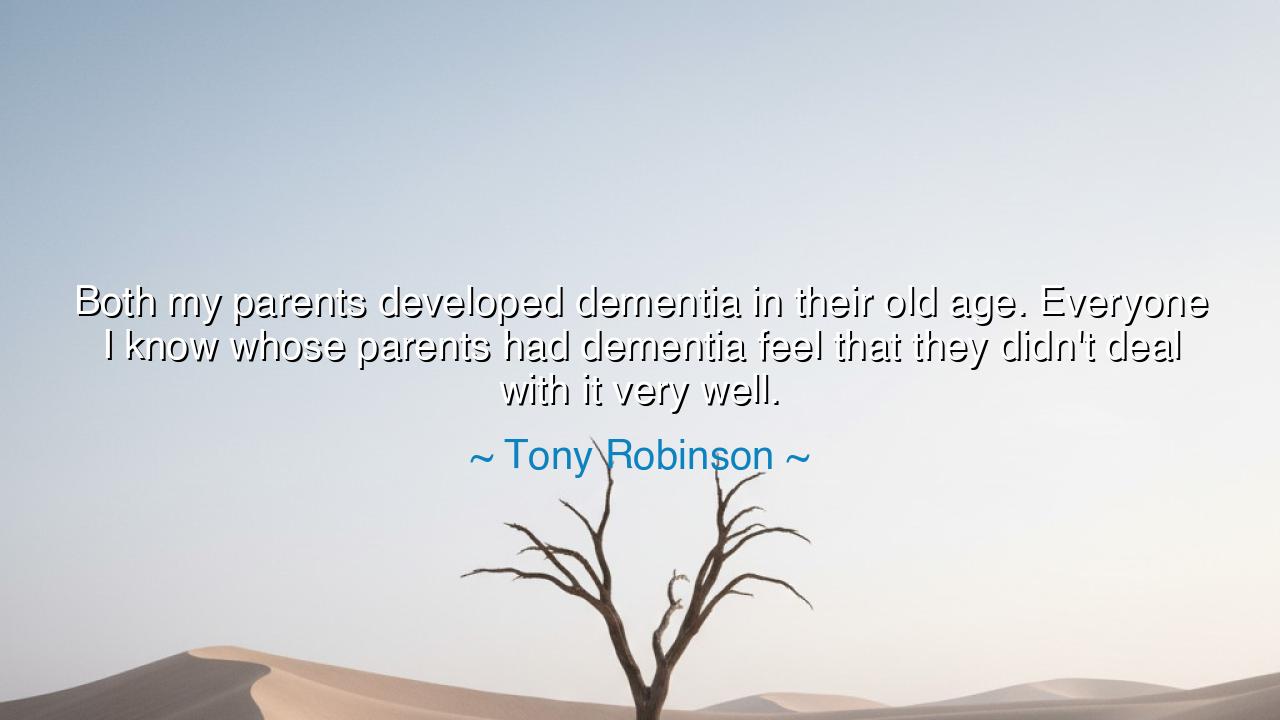
Both my parents developed dementia in their old age. Everyone I
Both my parents developed dementia in their old age. Everyone I know whose parents had dementia feel that they didn't deal with it very well.






“Both my parents developed dementia in their old age. Everyone I know whose parents had dementia feel that they didn’t deal with it very well.” — Tony Robinson
Thus spoke Tony Robinson, a man of both intellect and compassion, whose words here pierce with quiet sorrow and unflinching honesty. Beneath this simple confession lies a truth that many fear to face — the frailty of memory, the slow unraveling of the mind that once nurtured and guided. In his reflection, there is no bitterness, only the weary understanding of one who has watched the pillars of his world crumble gently, silently, before his eyes. Dementia, that thief of identity, does not only claim its victims; it also tests the hearts of those who love them.
When Robinson says, “we didn’t deal with it very well,” he speaks not in judgment, but in grief — the universal grief of children watching their parents fade into forgetfulness. The challenge of caring for the fading mind is one that humbles even the strongest spirit. For how does one love a person who no longer remembers love? How does one speak to a mother or father when the bond that once seemed eternal is now hidden behind clouds of confusion? To face this is to face mortality in its most personal form.
The ancients understood the sanctity of memory. In Greek myth, the River Lethe flowed through the underworld — its waters erasing all recollection of life. To drink from it was to lose one’s past, to step into oblivion unburdened yet hollow. In the illness of dementia, the Lethe does not flow in death but in life. Those afflicted wander its current while their bodies still walk the earth. And those who love them must stand on the shore, helpless, calling out names that no longer return an answer. It is this sorrow — this helpless witnessing — that Tony Robinson gives voice to.
Yet there is also something noble in this struggle. To care for a parent with dementia is to practice a love stripped of recognition and reward — love in its purest, most selfless form. It demands patience, compassion, and the courage to accept that some battles cannot be won, only endured. Like the Roman son who tended to his aging father though the old man no longer knew him, such love becomes a quiet act of heroism. For to persist in kindness when met with blankness is to reflect the divine endurance of the human heart.
Robinson’s lament — that few “deal with it well” — is, in truth, a mirror of our collective vulnerability. None of us are prepared for the reversal of roles, when the hand that once held ours must now be guided, when wisdom gives way to bewilderment. Society, too, fails to prepare its children for this sacred duty. We are taught to succeed, to achieve, to advance — but not to stay, to watch, to bear witness to decline with grace. And yet, it is in this waiting, this care, that the soul is refined.
Consider the example of King Lear, whose descent into madness brought both ruin and revelation. His daughters failed to understand his fragility, mistaking his confusion for folly. Only when it was too late did they grasp that the loss of reason does not erase the need for tenderness. Lear’s tragedy is not his madness, but the world’s inability to love him through it. Robinson’s reflection echoes this same tragedy across time — the pain of love unprepared for loss, and the guilt of those who learn too late how to let go with mercy.
Practical counsel for the living:
-
When your elders begin to forget, remember twice as hard — for both of you.
-
Do not measure your care by success; in the realm of fading minds, presence itself is victory.
-
Learn patience early, and practice empathy often; they are the tools of those who walk beside the fragile.
-
And above all, forgive yourself. No one “deals with it well,” for dementia teaches us not mastery, but humility.
For as Tony Robinson reminds us, the loss of memory is not the end of love — it is its final trial. When the mind fails, the heart must carry what remains. To stand beside one who no longer knows you, and still love them — this is the greatest act of remembrance. And in that silent devotion, both the lover and the lost are liberated from the fear of forgetting, for love, once given truly, endures even when memory does not.






AAdministratorAdministrator
Welcome, honored guests. Please leave a comment, we will respond soon